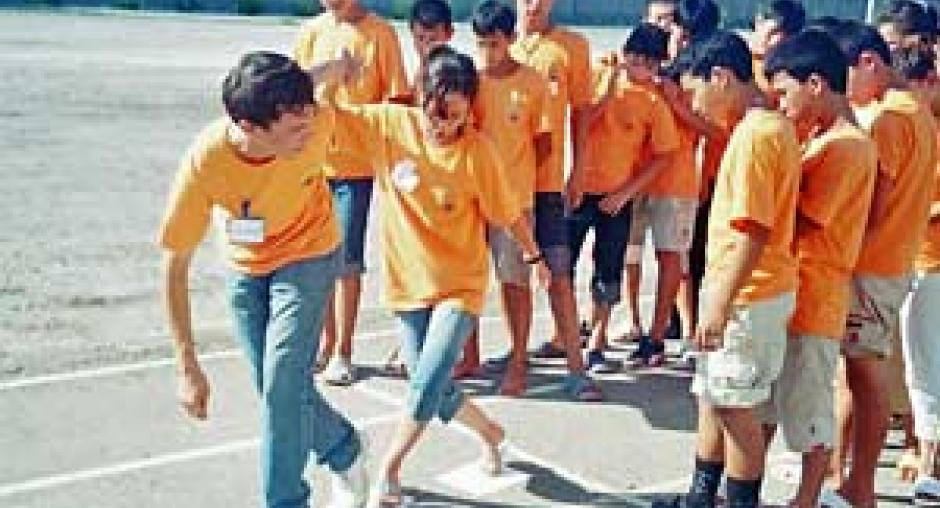Working for a better environment in Uzbekistan
Rashid Khasanov, a 20 year-old from Uzbekistan's Karakalpakstan region, discovered his calling when he learned about his region's environmental problems.
"When I started volunteering at the Debate Centre and Children's Ecological Club, I didn't really grasp the importance of this field," Rashid says. "But my first competitive debate focused on ecological problems. It gave me a lot of information and helped me to understand the importance of this work."
Rashid says he's chosen to focus on this field because Karakalpakstan, Uzbekistan's most northwesterly region, suffers from serious ecological problems.
Environmental problems
Karakalpakstan is largely desert, but also comprises part of the Ustyurt plateau, the Amu Darya delta and the southern part of the Aral Sea. Chief among its environmental problems are the drying up of the Aral Sea, soil and water salinity, and the pollution of the Amu Darya River.
Rashid, a third-year economics student at Karakalpakstan State University, says he likes debating, practical psychology, reading and rock music. But he doesn't have time for these hobbies anymore.
"I devote almost all of my spare time to working with non-governmental organizations (NGOs)," Rashid says. "In 2002, I joined the Debate Centre and Children's Ecological Club, which has been renamed the Resource Center for Democratic Education. I also worked with the UARH Uzbek Association for Reproductive Health and another NGO named "Kadm," or "Step". All these NGOs were active in a number of fields but focused on environmental issues."
After two years of volunteering, Rashid became president of the Children's Ecological Club, which provides leadership training to young people through debate and helps to build a responsible attitude towards nature in children.
"Early on as an NGO volunteer, I always tried to address ecological problems because they influence all spheres of life," Rashid says. "Now, as president of a youth NGO, I have prioritized our activities: stabilizing the regional environment, upgrading legal literacy, promoting gender sensitivity and increasing awareness of reproductive rights and health."
Women's rights and health
Although Karakalpakstan faces severe ecological problems, Rashid believes there are a number of other issues that are central to developing the economically depressed region. Citizens need to acquire a solid knowledge of the law and of their rights to build and reform a democratic society.
As part of its work, the club aims to help end discrimination against women and achieve gender equality in his region, where, for example, parents prefer to finance their sons' educations rather than their daughters'. Finally, Rashid says there is little public awareness of reproductive rights and health, which must increase if the health of citizens is to improve.
Raising awareness
Young people, particularly those who live in rural areas, are the club's target group. During Rashid's presidency, the club carried out a number of practical and awareness-raising activities designed to improve the local environment. The club's members cleaned up street litter, ran ecology conferences and held role plays, debates and quizzes. They also organized ecology cross-races, a form of relay race where participants carry out set tasks as they move from station to station.
Members spoke on radio programmes, contributed to various publications and helped to organize a public exhibit of children's pictures on the Aral Sea's problems. The club has also held information evenings at rural schools and conducted roundtables with young people.
Conservation
To extend its reach, the club co-operated with the World Wide Fund For Nature, or WWF, a global conservation NGO. The WWF helped issue newsletters, and organize public service announcements in other publications and on the radio about the region's endangered species. It also helped to organize children's tours to wildlife reserves so they could learn about the species and the problems firsthand.
An exhibit it organized on the threatened Bukharian deer species attracted the attention of members of the public who offered to purchase fodder for the deer.
"To my mind, it's too early to speak about significant changes in public opinion," Rashid says. However, I think my work is showing positive results. A number of young people have started to volunteer for our organization and we can also see that people from our target group have changed their attitudes towards ecological problems.
"I strongly believe that we can make the world better - the future is in our hands."

